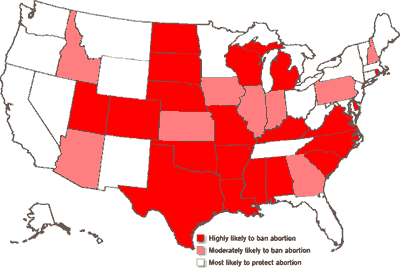The red is for blood
Give Up Blog has a map of abortion possibilities—the states likely to restrict abortion if Roe v. Wade is undermined, as estimated by the Guttmacher Institute.

That's disturbing. The South and the middle of the country would throw away an essential clinical service that many women depend on at some point in their life, as you can see from this overview.
- Half of all pregnancies to American women are unintended; half of these end in abortion.
- In 2002, 1.29 million abortions occurred.
- At current rates, about one in three American women will have had an abortion by the time she reaches age 45.
- 88% of abortions occur in the first 12 weeks of pregnancy.
- A broad cross section of U.S. women have abortions.
- 56% of women having abortions are in their 20s;
- 61% have one or more children;
- 67% have never married;
- 57% are economically disadvantaged;
- 88% live in a metropolitan area; and
- 78% report a religious affiliation.
Legal restrictions won't change those numbers, except perhaps in one way: more women will die or be rendered sterile by botched illegal abortions, so there will be fewer repeated abortions. I guess if that's what you want, it makes sense to legislate greater risk for women…but I would hope a majority would not want that. I fear that most vote for restrictions based on short-sighted priggishness, with no thought for the consequences.
I'm also looking at that strange island of Minnesota, surrounded by a sea of red and pink. I suspect that there are many hypocrites in the Dakotas and Iowa and Wisconsin who would willingly legislate the morality of the poor underclass of their state, knowing full well that if their daughters have a little 'accident', they can just slip across the state line for a weekend in Minneapolis—and maybe catch a little casino action in Mille Lacs after the procedure.


Sentience is about basic consciousness. As there is still not a clear definition of consciousness, no empirical tests currently exist to test consciousness as a whole. So I don't think the above can be supported.
OTOH selfrecognition, which is an indicator of consciousness is testable. Humans pass the test somewhere after 18 months.
There are tests about levels of intelligence based on synapse development; what I said about feeling of pain beginning at earliest in week 31 is empirical.